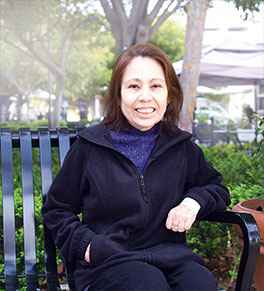Clinical trial has metastatic breast cancer patient on the move again

Alberta Bustamante came to UCI Medical Center in a wheelchair. The metastatic breast cancer patient is walking again because her UCI Health doctor was able to enroll her in an early-phase clinical trial thanks to a National Cancer Institute (NCI) grant designed to boost enrollment of racial and ethnic minorities in such research.
For a variety of reasons — including economic and cultural — racial and ethnic communities don’t get the latest and greatest care in general. They also are significantly underrepresented in clinical trials used to test the safety and effectiveness of emerging therapies.
“Metastatic breast cancer trials have mostly involved Caucasians in this country,” says Dr. Ritesh Parajuli, who is Bustamante’s oncologist. “The data we gather when minority patients have not been enrolled might not be applicable to patients from ethnic and racial minorities.”
Increasing access
Committed to ending these health disparities, the UCI Health Chao Family Comprehensive Cancer Center is using the NCI grant to reach out to people like Bustamante and others among Orange County’s Asian, Black, Latino and other underserved communities to make them aware of promising cancer therapy trials.
The cancer center received the prestigious award in August 2020 based on its historic success enrolling minority patients in clinical trials, the robust research infrastructure of its Stern Center for Cancer Clinical Trials & Research and its faculty’s expertise with early-phase clinical trials.
The $785,000 grant — Create Access to Targeted Cancer Therapy for Underserved Populations or CATCH-UP — enabled Parajuli to open a phase 1/2 clinical trial to test a new metastatic cancer regimen and actively recruit minority participants. He invited Bustamante to consider joining the trial.
A long journey
Like many patients, the Garden Grove woman was hesitant. But after discussions with her cancer team and son, Iker, who has been by her side throughout her long cancer journey, she agreed.
“I had already been through the worst with my initial breast cancer treatment,” she says. “I felt terrible then, but this seemed easier. I had a chance to feel a lot better. Why wouldn’t I give it a try?”
Bustamante was first diagnosed with stage II cancer in her left breast in 2008. She underwent a mastectomy, endured six months of chemotherapy and took tamoxifen, a hormone therapy that blocks estrogen, for eight years.
In 2016, she was injured in a car crash and was taken to UCI Medical Center, where X-rays and imaging scans showed a broken shoulder bone and the presence of malignant cells in her bones. She was advised to have her regular doctor check for a recurrence of her cancer but that didn’t happen.
Coping with pain and stiffness
In 2018, Bustamante began having terrible lower back pain and stiffness. Soon she was having difficulty walking. But it wasn’t until August 2019 that her primary care doctor told her the breast cancer had returned and had spread to her bones. By then, she could only get around with a wheelchair.
The physician referred Bustamante to Parajuli, who specializes in breast cancer care. In December 2019, he started her on the standard-of-care treatment for metastatic breast cancer: a daily dose of ribociclib (an enzyme inhibitor that disrupts cancer cell growth) and injections of the estrogen-blocking drug fulvestrant every 28 days.
When she enrolled in the clinical trial in November 2020, she began receiving an investigational agent called copanlisib, an enzyme inhibitor that may also limit tumor cell growth and delay progression of metastatic breast cancer, along with fulvestrant and another the enzyme blocker, abemaciclib.
From a wheelchair to walking
“After only eight weeks on the treatment, Alberta’s quality of life had significantly improved,” says Parajuli, assistant professor in the UCI School of Medicine’s Division of Hematology/Oncology and co-chair of the cancer center’s breast cancer disease team.
“Her back pain is greatly reduced. She’s sleeping well and has a good appetite. Her scans are showing no progression of the cancer in her bones and, best of all, she has greater mobility. She’s walking!”
Grateful to be able to get around on her own two feet again, Bustamante, 58, says cancer patients should look for the latest in treatments. “If you have the chance, join a clinical trial,” she says. “I feel so much better. You could, too.”
Related stories
Explore further
Browse more blog posts by topic.




